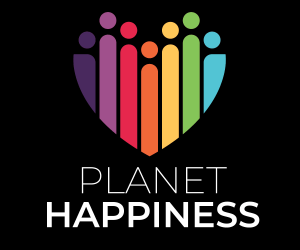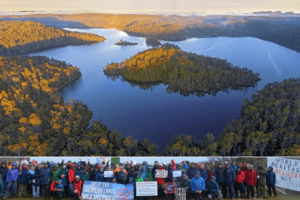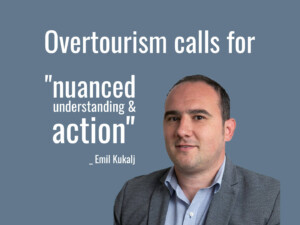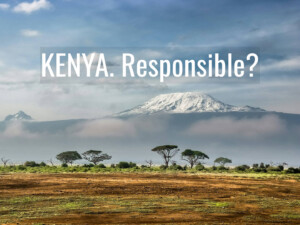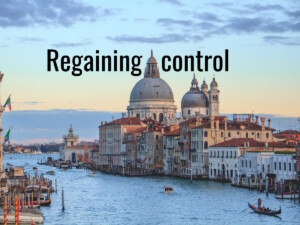Tourism & hosts’ well-being: Moving beyond GDP towards a better life

Everyone wants to be happy, or at least content. Travel & tourism has long proven to deliver that to its customers. But what about about the residents of places they travel to and through?
In this “Good Tourism” Insight, university professor Larry Dwyer identifies a promising holistic framework for benchmarking broader societal well-being.
Dr Dwyer is an ambassador for “GT” Insight Partner Planet Happiness.
Promoting the well-being of local residents is a fundamental objective of sustainable tourism development. In recent years, an increasing volume of tourism-related research has addressed well-being issues as they affect both tourists and destination residents.
Beyond gross domestic product
In the wider social science literature, a ‘revolution’ is taking place that has substantial consequences for the measurement challenges facing tourism development and resident well-being. For many decades, gross domestic product (GDP) has been the preferred measure for assessing progress in human development internationally, although it was never created for that purpose.
GDP relates to the value of the goods and services produced in an economy in a given year. The assumption behind using the GDP to assess well-being is that the higher the level of economic production, the better people are able to satisfy their material needs. While GDP is a critical indicator of a country’s macro-economic condition and the opportunity afforded to meet material needs, its inadequacy to measure people’s well-being is increasingly acknowledged.
GDP fails to:
- capture important elements of quality of life, such as leisure, health, civic engagement, social connections, and environmental quality;
- differentiate between transactions that enhance well-being from those that diminish it (money spent on pornography, drugs, and gambling adds just as much to GDP as the same amount spent on education and exercise);
- acknowledge inequalities of income and wealth that affect resident well-being; and
- put a value on the non-market services provided in households, the public sector, civil society, and broader ecological systems.
There is now a solid and well-established case for looking ‘beyond GDP’, using well-being metrics in the policy process, and assessing economic growth in terms of its impact on people’s well-being and on societies’ standard of living. The preferred option of the Beyond GDP agenda is to develop a dashboard of well-being measures. The dashboard would complement GDP and other economic indicators rather than discard or modify the GDP concept itself.
Human well-being
The social science literature offers diverse perspectives as to the nature of ‘well-being’, its drivers and its indicators. Well-being is widely regarded as a multi-dimensional concept incorporating notions of material comforts, individual freedoms, opportunities, mental states, and capabilities. It is a much broader concept than economic production and material living standards, and includes the full range of economic, social, and environmental factors that influence the overall quality of life of people and societies.
Efforts are well underway to develop measures of well-being to complement existing economic measures of destination progress in order to play an essential role in formulating, implementing, and evaluating tourism development across all destinations. Given the need for well-being estimates to inform tourism development paths, the measures used by tourism researchers must be credible with a sound basis in theory.
The most highly regarded conceptual framework for understanding and measuring well-being and societal progress more holistically is arguably the Better Life framework. Developed by the Organisation for Economic Co-operation and Development (OECD) in association with several Nobel Prize winning economists, Better Life identifies three pillars for understanding and measuring residents’ current and future well-being:
- Material living conditions comprise income and wealth, jobs and earnings, and housing.
- Quality of Life is captured through an additional eight dimensions that shape people’s lives — health, work-life balance, education & training, social connections, civic engagement & governance, environmental quality, personal security, and subjective well-being.
- Sustainability is measured using indicators associated with four different types of ‘capital’: economic, human, social, and natural. Maintaining the quantity and quality of capital stocks is essential for sustaining well-being outcomes over time.
The Better Life framework incorporates many of the well-being dimensions emphasised by other approaches. Its distinguishing features are its recognition of the importance of both subjective and objective dimensions of well-being, and its ability to differentiate between drivers of current and future well-being (which embeds sustainability in the framework). The framework is also flexible enough to include additional dimensions and indicators of well-being into the overall framework of analysis as these are developed by researchers, industry practitioners, and policy makers with input from the public.
A dashboard of interlinked indicators has evolved into the Better Life Index. This interactive web platform allows individuals and communities to set their own weights on each of the different dimensions of the well-being framework. It allows residents to participate in the debate on progress, and to identify what matters most in their lives.
While the Better Life well-being framework does not specifically address tourism, the suggested measures are capable of informing tourism stakeholders as to the essential role that well-being considerations might play in industry and wider economic development now and in the future.
Also see Paul Rogers’ “GT” Insight
“Why build well-being into destination resilience and tourism recovery?”
A tourism policy tool
With the Better Life framework, the Beyond GDP agenda is making progress towards developing universal measures of well-being to better understand people’s lives at the individual, household, and community level. Many of the identified indicators will change over time as better measures are developed and as destination policy makers reach agreement on indicators that better capture how tourism affects residents’ lives.
As well-being study matures in terms of its ability to generate meaningful metrics of well-being and progress, it will become increasingly relevant as a ‘compass’ for policy-making generally. Therefore, well-being is likely to become more important in guiding sustainable destination development and inspiring strategies to boost destination competitiveness. Furthermore, well-being will be a much more effective way of measuring tourism’s net contribution to the United Nations Sustainable Development Goals.
What do you think? Share a short anecdote or comment below. Or write a deeper “GT” Insight. The “Good Tourism” Blog welcomes diversity of opinion and perspective about travel & tourism because travel & tourism is everyone’s business.
Featured image (top of post): Arriving at happiness? By Jacqueline Munguía (CC0) via Unsplash. Graph climber overlay by Peggy_Marco (CC0) via Pixabay.
About the author
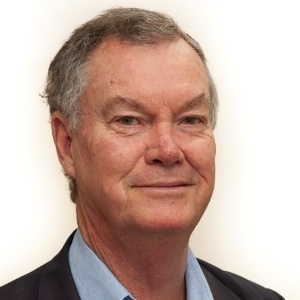
Larry Dwyer is a Visiting Research Professor in the Business School at the University of Technology, Sydney. He is also an appointed Ambassador for Planet Happiness. Dr Dwyer has held professorships at universities in Australia and Europe. An elected Fellow and past President of the International Academy for the Study of Tourism, Larry has also served as President of the International Association for Tourism Economics, and currently serves on its International Advisory Board. He is also a Foundation Fellow of the Council of Australasian University Tourism and Hospitality Educators and Researchers (CAUTHE).


